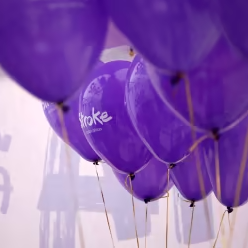
Press release -
New digital tool launched for stroke survivors with communication difficulties
As many as 350,000 stroke survivors with aphasia, a common communication disability, are at greater risk of becoming lonelier and more isolated during the pandemic, according to the Stroke Association (i).While people across the UK have been able to keep in touch with their loved ones thanks to technology, the charity is now highlighting the struggle that stroke survivors’ with aphasia face getting online.
Aphasia is a language and communication disorder, of which stroke is the most common cause. There are 1.2 million stroke survivors’ in the UK and around a third (33%) have aphasia.(i) Aphasia can affect a person’s ability to speak, read, write - and sometimes understand speech and use numbers. Aphasia affects language not intellect.
Pat Sweetingham, 57, from Basingstoke had her stroke in June 2003 which left her with aphasia and epilepsy while she is also now partially sighted. Although Pat’s speech has slowly improved over time, she still finds talking on the phone, reading and writing to be very difficult.
Pat said: “Aphasia can feel like an invisible disability. I can talk but I couldn't write and reading hard. Aphasia has been hard. At first I could not talk at all. I just had a few words. When you say you have aphasia most people do not know what you are talking about.It has improved over time but there are still things that I find difficult, talking on the telephone is very hard. Sometime I can’t find the words or can’t say the exact word.”
“Some days are better than others. Some days I am tired and it makes it worse. I have learnt to use lots of strategies when my aphasia makes it difficult to talk. I like to use pen and paper to write down keywords. My aphasia means that I can’t write full sentences but I can send an email with a few words. It’s the small words like ‘and, if, is’ that is difficult for me.”
Juliet Bouverie, Chief Executive of the Stroke Association said: “When stroke strikes part of your brain shuts down and so does part of you. A third of stroke survivors have aphasia, which can rob you of your ability to read, write or speak. This pandemic has created an epidemic of loneliness, particularly among stroke survivors with aphasia. Everyone’s world has shrunk due to the pandemic but imagine the agony of being confined to the walls of your own head.”
Today the charity launches the ‘Getting Online for People with Aphasia’ guide, to mark Aphasia Awareness Month. The guide will:
- Equip stroke survivors’ who have aphasia with the skills they need to get online and use tools, such as Skype, WhatsApp, Facebook and Zoom, so they can keep in touch with family and friends
- Enable stroke survivors to connect with the stroke survivor community
This new digital guide has been designed following a UK-wide consultation of stroke survivors’ with aphasia (ii). It contains helpful information and step-by-step guidance on how to get online and search the internet. The guide uses aphasia-friendly text supported by pictures and key words. It can be used with a text reader and covers the use of many devices; computer, laptop, tablet and smart phone.
According to the Revealing Reality report (2019)(iii) commissioned by the charity, stroke survivors with aphasia said their disability was misunderstood by those close to them, as well as by the wider community. They also reported that isolation had negatively impacted their mental health and well-being, leaving them frustrated and low in confidence. The charity fears that aphasia may lead people to withdraw further from friends and family, putting them at even greater risk from isolation during the pandemic.
Juliet continues: “You don’t have to feel imprisoned by aphasia. This guide provides a vital lifeline and gives you the skills and confidence to get online. It’s particularly helpful for keeping in touch with loved ones, guiding you through things like video calling. Aphasia doesn’t go away and that’s why we’ve developed a tool to help overcome the challenges that you might face.
“It opens up a world of opportunities that may not have been previously accessible to stroke survivors with aphasia. I’m urging you to use and share this guide. If you’re a stroke survivor with aphasia who needs help getting the guide or would like a printed version, please contact our Stroke Helpline (0303 3033 100). Stroke is a lonely experience, but we’re here to support you to rebuild your life after stroke. The guide will also help you to access My Stroke Guide an online community of stroke survivors where you can share experiences, ask questions and find solutions.”
For stroke survivor Pat, the introduction of technology has been a powerful tool to combat her aphasia.
Pat said: “Technology has been an important part of my recovery. My speech therapist introduced me to software to practice my communication. I taught myself through trial and error, building up my skills slowly over time.’
“I also use a speech reader to read my emails to me. That is the brilliant thing about technology, you can’t do that with a letter. People with aphasia must be allowed to try things out for themselves and see what works for them when it comes to technology.
Kamini Gadhok MBE, Chief Executive of the Royal College of Speech and Language Therapists said: “We know that a third of stroke survivors have aphasia and problems communicating and understanding how to use those little things that we take for granted, such as online technology to keep in touch with others. Even being able to read a phone number can be a huge struggle. These barriers often leave individuals feeling isolated and alone, so this new tool will help them to stay in touch with loved ones, keep connected with friends and find support from the aphasia community.”
The ‘Getting Online for People with Aphasia’ guide is available at: www.stroke.org.uk/aphasiaonline. It is the first element in a suite of digital resources for people affected by aphasia which the Stroke Association are producing.
The Stroke Association is hosting an ‘Aphasia Chat’ on Tuesday 23 June at 11:00.
Go to: @TheStrokeAssoc to be part of the conversation. You’ll be able to connect with other stroke survivors’ with aphasia, ask questions and share tips about your recovery.
-Ends-
For more information on research at the Stroke Association, contact: Ken Scott, PR & Media Officer at the Stroke Association at ken.scott@stroke.org.ukor 0115 7788429
Notes to editors:
- (i)Stroke Association (2018) State of the Nation. (February 2018) Available at https://www.stroke.org.uk/sites/default/files/state_of_the_nation_2018.pdf
- (ii)Aphasia Suite (2018): Consultation with People with Aphasia. Report for the Stroke Association on the Consultation with People who have Aphasia.*
- (iii)Revealing Reality (2019). Life with aphasia – Stage 2 report.*
*These reports are not yet publicly available. If you would like further information please contact: Ken Scott, PR & Media Officer at the Stroke Association at ken.scott@stroke.org.ukor 0115 7788429
Topics
- Stroke strikes every five minutes in the UK and it changes lives in an instant.
- The Stroke Association is a charity working across the UK to support people to rebuild their lives after stroke. We believe that everyone deserves to live the best life they can after stroke. From local support services and groups, to online information and support, anyone affected by stroke can visit stroke.org.uk or call our dedicated Stroke Helpline on 0303 3033 100 to find out about support available locally.
- Our specialist support, research and campaigning are only possible with the courage and determination of the stroke community and the generosity of our supporters. With more donations and support, we can help rebuild even more lives.
- You can follow us on Twitter, Facebook and Instagram.











